Text
Finarfin The Snake
Finarfin is the worst father out of Finwe’s sons, and here is why;
I theorize that he was a neglectful father, without really truly realizing it. He was not around often, to busy wrapped up in his brothers politics. I have a feeling he was actively pitting them against each other in hopes that he would be able to usurp the throne. The Valar and most of the Noldor see him as the most reasonable compared to his brother(s), the one with the best morals. In reality, he was cold and calculating, waiting to seize his any oppurtunity that went his way.
Since he was not around, Finrod had to act like the father with his siblings, mostly with Galadriel. He would braid her hair, make sure she was fed, played with her so she wouldn’t get bored. It is why he is so “dear to her heart.” It is because he was the one who took care of them all, the one who always keep them safe. Not her real father.
To further my point, Finarfin does not go into exile with his own children. Every single one of them goes across the Hexeracke to follow their cousins, but he stays behind, even though there is a chance they will not see them again. Why does he do this? Well he sees an opportunity. All of his brothers are gone, the title of king would immediately pass to him. Ultimately he cares more about the throne then his children. I wonder if he may even see them as a threat to his crown, someone who could oppose him.
Then why do his children leave? I truly believe they do care for their father, children cant help but love their parents. Galadriel most of all, idolizes him.
Most time a child that is born from generational trauma, inherit “negative” traits that the parent had. With Feanor, many of his sons inherited bloodlust and a fiery spirit, that pitched against others and caused many wrongdoing in Beleriand. For Fingolfin it was his stubbornness, recklessness and control that were inherited. We see this in mostly Fingon and Turgon. However with Finarfin and his children, it is there greed for power. Most of this is displayed in Galadriel in the FOTR where she strives to replace the dark lord and take is place in dominion of middle earth. Of course this is the ring manipulating her, but there is that core desire in herself that believes this. Finrod is harder to place, but there is a reason the fandom refers to him as a “snake”. He does strive for power. he is often a mirror image of his father, without even realizing it.
They all leave Valinor in hopes to be greater then they already are. What happens to neglected children, they often try to receive validation from their parents, over and over again even though they always get the same result which is being ignored. They hope to prove to their father that they can be like him, have their own realms and kingdoms. They know how to subtly manipulate others, and they do it without really recognizing it is as manipulation.
He is seen as the best of the sons of Finwe, like how his children are often seen the kindest and wisest of the noldor, but in fact they are not. They are snakes, and carry on the generational trauma that their father had left them.
In the end, I think Finarfin realizes his mistakes as a parent. When Finrod is reembodied after his death, they finally have a chance to reconcile.
“But Finrod walks with Finarfin his father beneath the trees in Eldamar.“-Lay Of Lethian
45 notes
·
View notes
Photo
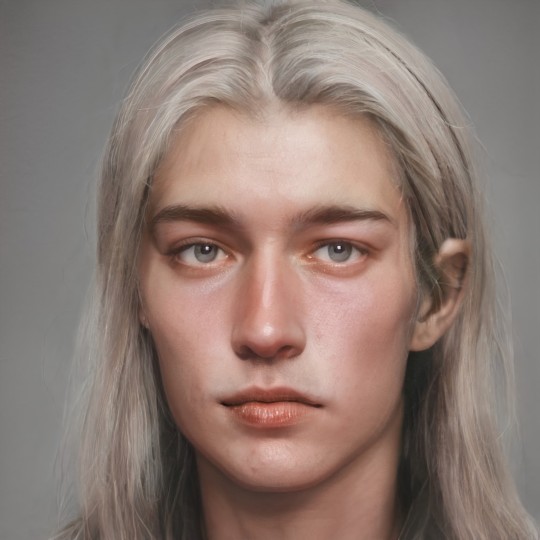





Part 7 of my artbreeder Tolkien series featuring the Lords of Doriath. In order is Beleg Cúthalion, Daeron, Mablung, Saeros, Galathil, and Celeborn.
House of Fëanor - House of Finarfin - House of Fingolfin - House of Finwë - House of Orodreth - House of Thingol
42 notes
·
View notes
Text
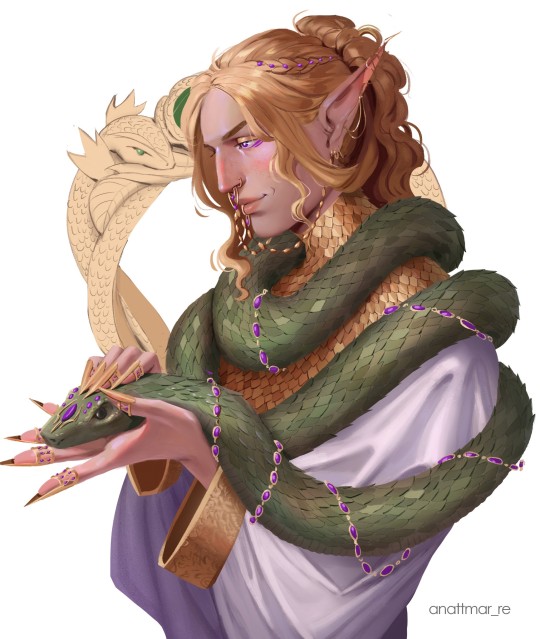
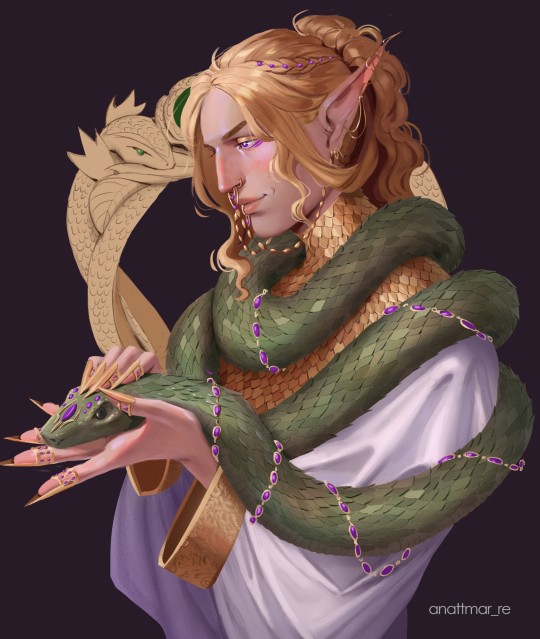
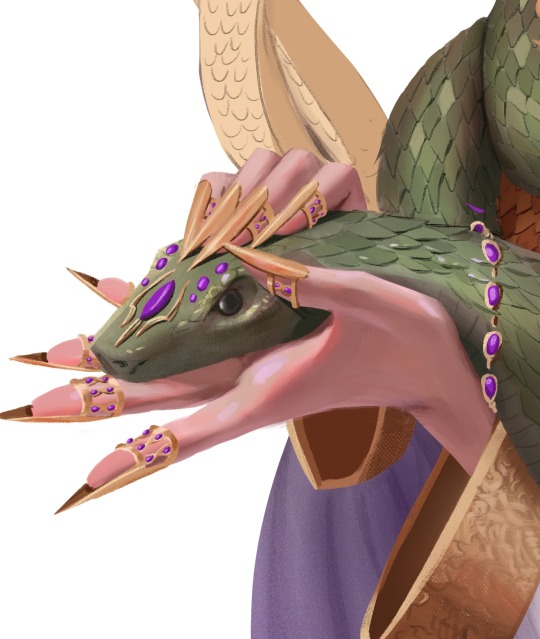

Finrod and his pet 🐍🐍🐍🐍🐍
AU where Nauglamír is a snake🐍
3K notes
·
View notes
Text

Ok- I just want to take a moment to say thank you to everyone who has liked and reblogged my Maglor post, it really is incredible to see it get 100 notes!!!! This post really came out of nowhere and I just wanted to share some of my thoughts on one of my favorite characters, and here we are! So thank you and I’ll try to maybe post something again soon, maybe, hopefully… 😂
6 notes
·
View notes
Text
Turgon the Proud

You may have noticed that Turgon, Fingolfin’s second son is titled, “the wise”, which I find rather perplexing given what we know about him. His supposed wisdom may derive from his hesitancy to buy into the post darkening fervor that dominated Tirion in the wake of Feanor’s impassioned speech and terrifying oath. Or perhaps it was not participating in the kinslaying, maybe it was just staying with his people despite his well founded reservations and later knowledge of the Doom of Mandos. But those are hardly acts that he alone perpetrated and yet only he is called the wise…
Turgon certainly lead an interesting life and was strong a man of conviction and fortitude, much like the rest of his family. Also like them he suffered a great deal of personal loss in life. First losing his wife on the Helcaraxe, being forced to choose between his soulmate or his young daughter. Then it was his younger brother, Argon, who died so soon after their arrival in Beleriand that their last memories of each other was terror, battle, and death. He tried to settle again first in Nevrast, and then in his true magnum opus- Gondolin. But his losses didn’t end there; then it was his father who was larger than life but died tragically, his brother, and sister that would then leave him, saddling him with not just the high kingship but also stuck with a troubled nephew that was far beyond the reach of his even more troubled uncle. In these circumstances it’s a wonder how he got as far as he did.
Having lost so much and been put in such an irredeemably unstable situation, we have to wonder how his apparent wisdom helped him. He was right to take the advice of Ulmo and build the hidden city of Gondolin, but he failed where his cousin Finrod didn’t, he got attached. It’s not hard to see why though and maybe he could be forgiven for his adoration of his wonderful and divinely hallowed creation. This was someone who hadn’t known stability in years, who’d been ripped away from his gleaming home city in Valinor, and here was a safe and beautiful replacement built in its likeness, that must have made him feel more at home then he’d feel in centuries. Unfortunately he got too attached and as we’ve learned from the Silmarillion, attachment ultimately derives from selfishness and greed, and will only serve to hasten one down the path of their doom- a path that often included horrific collateral damage, we should think chiefly of Feanor for this analogy.
As the city came under attack, I’m sure Turgon would have stood shocked, shocked that his great creation would fail. It was Gondolin, it meant safety, it was too big too fail. They had Ulmo on their side. Didn’t they? How could this have happened? In that moment of shock, his lords would pick up the slack and go off in defense of the city, as Turgon reeled from the crushing blow of knowing that he was not going to be spared from the Doom of the Noldor. Though he came to terms with things and tried to defend the city ultimately he couldn’t handle it, the fact that it was happening meant they’d lost. He couldn’t see “the plan” that Eru had set in motion, in that moment it seemed like another loss for him, just one more, to put a point on a life filled with loss. What he couldn’t see was that it had to happen, and why the elves needed that last stronghold in the area. He failed to notice the importance of his daughter, son in law, and grandson- he was really tasked with creating the city so Idril and Tuor could meet and marry, so that Earendil could be born a prince- the promised prince if you will.
For someone so wise, he could not see beyond his own loss. As such he climbed the stairs of his tower one more time, this time the heat of the burning city made the ascent horrendously painful, but if it would be defeat for them, then he’d go down with it. We can almost hear the pleas of Idril as she begged him to come with her and lead the refugees on, but that was a bridge too far for him. He would not leave his city, not be run out in defeat, made to flee his greatest creation- and god forbid subject himself to the embarrassing and degrading status of kingdomless king, under the care of some “lesser lord”.
As the flames rose, the heat began to break, chatter, and bend the grand tower of the king, and down it fell with Turgon, high king of the Noldor, king of Gondolin, and son of Fingolfin stuck inside. When it happened there was no pain just release, he’d already felt the greatest pains of elvish existence and this one was nothing.
Returning to our commentary, I ask once more, where’s his infinite wisdom? He made the same mistake as Feanor, a man who he hated and blamed for all the loss in his life, and yet he got attached and greedy and in doing so lost all foresight. He was haughty enough to think that his creation was better and wouldn’t be subjected to the same fate as everyone. And yet he was warned by Ulmo, he saw the sacrifice of Finrod and all that he was willing to give up in search of a great good. Turgon born the same year as Finrod, his friend and travel companion always, wasn’t smart enough to see why Finrod did it all, and I’m sure he scoffed at his death and used that to cope with another painful loss. But when faced with the same situation was unable to make the same sacrifice. Not his city, no, that was something others dealt with, not in Gondolin- never. Turgon’s death was senseless and frankly cowardly when we know how treacherous the journey would be for the refugees whom he threw to the wind. And by the end of his life he’d become all that he sought to prevent, someone like Feanor or his sons, who’s pride was one of their driving forces, making them lose sight of reality as it was and as it was meant to be by the divine. From all we have on Turgon, I struggle to see infinite wisdom, can you see it? So I’ll ask you, is this wisdom that we’re looking at or unmitigated pride and arrogance?
If you enjoyed this little essay, please check out my others which are all saved on a master list. Comment your thoughts on Turgon!
A special thank you is in order to @maddogpony for their kindness in allowing me to use their beautiful picture of Turgon. Thank you!
#turgon#fingolfin#gondolin#idril celebrindal#tuor#earendil#fingon#finrod#aredhel#maeglin#feanor#silmarillion
49 notes
·
View notes
Text
I agree, these romances are so much than they seem, especially the one between Aegnor and Andreth. Their relationship is so heartbreaking to me because they were damned if they did and if they didn’t, in that way Finrod wasn’t wrong, but he took a very pragmatic view of things and in doing so discounted the personal and emotional aspects- making his advice callous and harsh especially when, as you pointed out, he had the foreknowledge and foresight to see how this would work out for them.
I love your take on this! Thank you for sharing it!
All right since you all like sadness as much as I do, let’s talk about Aegnor and Andreth some more.
Let’s talk about the fact that they were the first recorded Elf/Human pair EVER to fall in love. I don’t think people give that enough consideration of how huge that was. Aegnor fell for Andreth, and she for him, and for the first time that gap between their races was bridged by love.
But they didn’t get the miracle, they didn’t have the universe changed for their sakes. Theirs is the saddest story of all, not because their love was any less than the others, but because they didn’t have anyone supporting them. Arwen and Aragorn had the support of Galadriel and eventually Elrond. Idril and Tuor I’m not as familiar with but I believe her father supported them? And we all know that Beren and Luthien had Huan and Finrod on their sides. But it’s even sadder when you realize that Finrod didn’t offer that same support years before for his little brother.
This is not to hate on Finrod. I love him and I know he meant well. He truly felt he was doing the right thing for both Aegnor and Andreth’s sakes, and with it being the first time such a thing had happened no one knew how to handle it. But can you imagine the gut wrenching feeling when Finrod knows that his little brother is never going to return to life because he won’t live in a world without Andreth in it? Can you imagine him seeing Andreth’s anguish and realizing that separating them didn’t lessen their love or make it fade, it only made more pain?
It’s not a coincidence that Finrod once again finds himself on the precipice of watching another immortal fall in love with a mortal, that this time when he’s asked to help he has an oath and the knowledge of the pain that Aegnor and Andreth suffered weighing on him. Finrod fights hard for Beren, not just because of the oath and friendship but also out of memory for Andreth and Aegnor, and to make sure what happened to them wasn’t going to happen again on his watch.
Andreth and Aegnor’s tragedy was a lesson that was hard learned, but it was one that Finrod never forgot and one that others learned from.
#silmarillion#aegnor#Andreth#andreth/aegnor#Finrod#i love all these characters so much#and now we cry
144 notes
·
View notes
Text
Dark and brooding for good reason- really wonderful rendition of one of my favorite characters

Maglor sketch
#Lotr#lotr imagine#lotr elves#middle earth#the lord of the rings#sketch#doodle#maedhros#maglor#feanorians#sons of feanor#caranthir
68 notes
·
View notes
Photo
Celegorm in his element
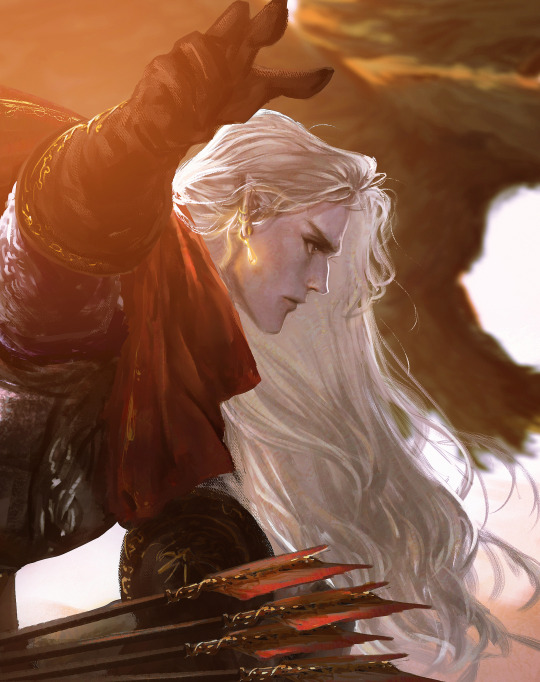

Himlad
Feanorian week, Day 3
3K notes
·
View notes
Text
Just a repost but I thought I’d get in the Feanorian week spirit- even though this is out of order I think.
But I’d love to know your thoughts!

The Tragedy of Feanor
Feanor for all his graces and faults is a morally grey character at best, and to be sure, he has his moments of absolute and unrepentant villainy, preceded by times of genius and love. I’m not sure one can comfortably or sustainably come down on either side, that he is evil through and through, or a misguided hero. As with most things he falls somewhere in between, both by his own doing, but also at the hands of forces far beyond his control. In many ways Feanor is a victim of circumstance, in the same way that many characters in Greek tragedies are- such as Oedipus or Orestes. Who make what they think are decisions of free will, that are only a piece of a larger game that they unknowingly play forward. To illustrate, once the metaphorical well of unity that held the Noldor together, even tenuously, was poisoned by Melkor, the fact that it happened wasn’t the fault of Feanor. It was a predictable outcome of the failed judgement of the Valar- who themselves were perhaps unable to change course. The events that followed (threatening Fingolfin, exile, Melkor’s destruction of the trees, theft of the silmarils, death of Finwe, flight of the Noldor, the first kinslaying, and the abandonment of Fingolfin’s host) are of course choices made by Feanor. Like Orestes driven to kill by the Gods the murderers of his father, who happened to have been his mother and her lover, he is forever tormented for the matricide. A pawn in a wider game, the same can be said of Oedipus., who like Feanor, was in essence doomed from birth onward. What makes these stories tragic is the characters inability to change the course of events, their helplessness despite being empowered by the same forces that now put them against morality itself. Worse yet, is that it had to happen. In Feanor’s case, where would Arda be had he not roused the Noldor to go to Beleriand? Everything was dependent on that choice, made in haste and in the passion of the moment. There was never a way in which Feanor could be released from this fate, he had to fulfill it. Should one be surprised that such an intelligent and powerful such as he is described, would be anything but rightly frustrated at beinh pinned under the thumb of the lame duck Valar? A group also tied to the greater plan of Eru. Like a true Prometheus, he rebels, bucks against the straining weight of limitation, seeking only to better the world and create new more light things. But again, his creation of the silmarils, had to happen- there was ultimately no choice. The divine light had to be captured somehow and given to the world itself, as a sacrifice of sorts, an offering of great and irreplaceable magnitude. Prometheus had to give humanity fire, there was no choice, they would not survive the earth for which they were created to inhabit. For his trouble, Prometheus was forever damned, a fate not unlike Feanor’s own. The cruelty of the story is the inevitability of it- there was no other way, no choice. Feanor being the hero or villain would be more convincing had he not been a mere instrument in the greater plan of Arda. Despite being the prime mover and the one who ultimately set in motion the defeat of not one but two dark lords, was punished to never be reembodied- granted he called such a doom upon himself, but there was not a choice. That is the tragedy of Feanor. Like the cursed line of Atreus, it’s not surprising that all of his sons and his only grandson met similar ends- burdened with false choice, made to play in the game of Arda, pawns of fate.
Tell me your thoughts! If you like this critical appraisal look at my other posts especially “The Curse of Elves” since this is a loose follow up on that.
(Art credit: Kimberly80)
(See  Aeschylus’ Oresteia, Sophocles Oedipus Rex, and the story of Prometheus for more detail. The links are for full free copies of the plays referenced)
50 notes
·
View notes
Text
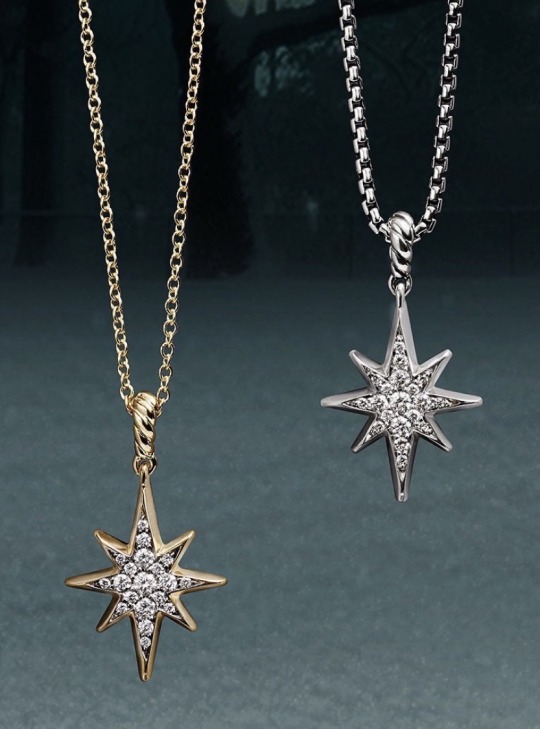
Nice example of a Feanorian star out in the wild- I think his sons would all have been given something like this as kids and they’d have worn them into adulthood.
What do you think?
(David Yurman- North Star necklace)
#feanorians#house of feanor#feanor#sons of feanor#maedhros#maglor#celegorm#caranthir#curufin#ambarussa
77 notes
·
View notes
Note
Absolutely excellent analysis- and I agree wholeheartedly!
Reverse Unpopular Opinion: headcanons (and any textual evidence I may be unaware of) about Feanor being a good dad. Don't know if that exactly counts as unpopular, but a lot of people just default him as a bad father figure because of the oath etc.
I think the fandom is fairly divided on Fëanor being a good dad or not. Myself, I prefer that interpretation because it makes everything so much more beautifully tragic. What is the point of the Fall if the fallen one was not good before he fell?
The Silmarillion doesn’t give us a whole lot of insight into the relationship between Fëanor and his sons, but it mentions that
Fëanor and his sons abode seldom in one place for long, but travelled far and wide upon the confines of Valinor, going even to the borders of the Dark and the cold shores of the Outer Sea, seeking the unknown. (Chapter 5)
and
with him into banishment [to Formenos] went his seven sons (Chapter 7)
and
Then Fëanor swore a terrible oath. His seven sons leapt straightaway to his side and took the selfsame vow together (Chapter 9)
Now, to me these quotes seem to illustrate that Fëanor managed to inspire a great deal of loyalty in his sons. Admittedly, loyalty is not the same as love. Even children of abusive parents can show loyalty towards those same parents, but I don’t really think that’s what’s happening here. All seven sons are eager to follow their father, even when there are perfectly viable alternatives if they really didn’t want to go with him. They could have stayed with Nerdanel, they could have remained in Tirion with their cousins during Fëanor’s banishment, they could have chosen to remain behind during the Rebellion. Portraying their choices as solely a result of manipulation on Fëanor’s side takes away all their agency and only serves to infantilise them, in my opinion. The sons of Fëanor are all adults by the time of Fëanor’s exile to Formenos, their ages being somewhere between 150 and 250 years if we’re going by estimates based on the Tolkien Gateway timeline. They are responsible for their own decisions, and time and time again they choose their father.
Then we move on to the events following the First Kinslaying:
But Fëanor [...] took counsel with his sons; and two courses only they saw to escape from Araman and come into Endor: by the straits or by ship. [...] Therefore it came into the hearts of Fëanor and his sons to seize all the ships and depart suddenly ( Chapter 9, emphasis added by me)
This is not Fëanor forcing everyone to go along with his solo mission. This is him listening to his sons and all of them together making plans for the journey. Maedhros, as the only one, disagrees with his father specifically about the burning of the ships, but apart from that they seem to be in agreement about what to do. Note that at this point pretty much everyone is making morally questionable decisions. This is after Alqualondë, after the Doom of Mandos, after the Fall. Arguing that Fëanor is acting like a bad father during these events is a bit irrelevant because he’s generally not acting like a terribly good person. But his sons aren’t acting like good people either. They all seem to be willingly complicit in their father’s actions, apart from Maedhros’ aforementioned refusal to join in the ship burning.
Then Fëanor dies in battle and
knew with the foreknowledge of death that no power of the Noldor would ever overthrow [the peaks of Thangorodrim], but he [...] laid it upon his sons to hold to their oath, and to avenge their father (Chapter 13)
This one is more questionable, Fëanor is certainly not giving his sons an easy way out here when he makes them promise to complete a task he himself believes to be impossible. However, bear in mind that a) Fëanor is literally dying here, he’s not really considering consequences or thinking rationally, and b) would it even have changed anything if he had tried to release his sons from the oath at this point?
If we go with the oath as an actual force/entity, the wording of it makes it unclear whether Fëanor would even have had the authority to release anyone from it, and if the driving force behind the oath was not an external force, but simply the seven sons’ love for and loyalty to their father, they would most likely have sought to avenge him and reclaim the silmarils anyway. There would have been no way back to Valinor, no way to undo the kinslaying or the ship burning. The only way for them would still have been forward into the unknown.
The exact nature of the oath is an interesting topic for discussion, and I’m not going to dig up all the textual evidence for one view or the other, but I’ve always preferred the interpretation where the sons of Fëanor could technically have chosen to break their oath, and that the torment is not from any external force but from the feeling that they are dishonouring Fëanor’s memory by doing so. By making it an active choice to continue their pursuit of the silmarils, the sons of Fëanor become much more morally complex as characters, which I’ve always enjoyed.
Another discussion that touches upon the same themes is the question of whether Fëanor’s rebellion was only motivated by his love for the silmarils, or if he also wanted to avenge Finwë. I like to think that Fëanor genuinely loved his father and that his grief and rage in the wake of the Darkening was just as much for Finwë as for the loss of the silmarils.
Would it not be sublimely tragic if all of this was caused by a son’s love for his father, and his sons’ love for their father in turn? Would it not be a much better story if everything from the swearing of the oath, via war, betrayal and kinslayings, to Maedhros’ last plunge into the fiery chasm, was an act of love?
232 notes
·
View notes
Photo
Poor Gwindor he was such a fox! Can’t believe our girl Finduilas would leave him for the personification of a dumpster fire called Turin. Anywho I adore this series! 💙





Part 5 of my artbreeder series, featuring Orodreth’s kin in Nargothrond. In order, Orodreth, unnamed Sindarin wife, Gil-galad, Finduilas, and Gwindor (pre Nirnaeth Arnoediad) These characters get little screen time but I love them to bits.
House of Fëanor - House of Finarfin - House of Fingolfin - House of Finwë
104 notes
·
View notes
Text
Fingolfin: A Figurehead, Father, and Person

A Figurehead
If Feanor presents a compelling, albeit deeply flawed character, then it perhaps shouldn’t be surprising that his eldest half brother, Fingolfin shares many of the desirable and undesirable traits of Feanor making him equally interesting. In many ways Fingolfin exists to represent an alternative, what could have been for Feanor had his mother lived, had his fire been tamed and his iron will tempered from his youth onward. Fingolfin had the perfect childhood, with Indis who one could only imagine to be a doting mother, and Finwe, distant as he could be, ever trying to please Feanor first, gave more to his second son than his looks. Finwe imparted upon Fingolfin the same strength of character that once compelled him to leave Cuiviénen and bring his people over the sea to a new home. But also a deep and abiding nobility in bearing and mind that all Finwe’s sons had, but Fingolfin matched it with his own fortitude, stalwartness, and sheer recalcitrance in the face of opposition leading to an incredible leader. Though he shared some of the same flaws of his older brother and his people- being stubborn, restless, impulsive, and haughty. He can be faulted for these, but ultimately they led to his own demise. Such characteristics, good, bad, and otherwise are not just Noldorin mainstays, but also outgrowths of their uniquely privileged positions as princes. All that being said it’s clear from the limited writings on him, that Fingolfin was a good king, who power by force of will along (and personal wounds inflicted by Feanor) led the remnants of the Noldor host over the Helcaraxe, only to come and find Beleriand in abject chaos with Morgoth terrorizing the Feanorians, having even captures his nephew Maedhros. After coming into a bad situation, he took up the role expected of him, moving into position for continued battle even after such a hellish exit from Valinor at the behest of his fiery and murderous brother, who had long since perished. To then accept the penance of Maedhros and gracefully take up kingship is nothing but a testament to his character, and showed a maturity and confidence that Feanor wouldn’t have been able to muster himself. He then upheld the Siege of Angband for as long as possible, allowing his people to settle finally more woes than could have been foreseen. The end of it would only come due to his self sacrifice by challenging Morgoth to single combat, in the hopes (false as they may have been) that his life could be laid down and ransom some of the Noldor soldier who otherwise would perish at the hands of the hosts of Angband. An act worth all the praise it receives, fighting till the moment his life was crushed out of his body, fighting for the people he served, loved, and believed in- allowing them to live on and continue the fight themselves.
A Father
Having sacrificed himself, he left behind three children who would have missed him dearly, and a fourth had he lived to see the amazing heroics of his father. Beyond what is known it is hard to nail down the true personality of Fingolfin, and how he would have been in a depressurized environment like at home with family. Going off my own conjecture, it would seem that he did best with his two eldest and struggled with the younger pair. Fingon was just an amiable person, and you’d be hard pressed to find a being other than Morgoth himself that he did not like. Turgon must have shared the same seriousness and haughtiness of Fingolfin, giving them a similar way of going about things, added to that Turgon was clearly an able leader and administrator himself and would have shown great interest in Fingolfin’s official capacities. Aredhel and Argon were the free spirits of the family, not content to stay in any one place, doing any one thing, and certainly not at the behest or worse yet requirement of others. Fingolfin, who was so ruled by duty probably misunderstood them and struggled to relate their desires. Aredhel was “strong-willed and stubborn, doing what she wanted rather than listening to other peoples' advice”- strong willed like her father, but in an unrestrained way, putting her further away from him. (Silmarillion, Of Maeglin) While we would have to imagine that the four children were close and cared deeply for each other, they were probably often at odds just by dint of their personalities, and Fingolfin must have had trouble mediating such disputes, himself having a complicated sibling relationship with Feanor.
A Person
All of which leads to me to say that he must of have a good person, far beyond the kingly duties or strenuous familial relations, he was someone that despite his own myriad of flaws, tried his best to do good where possible by stepping into whatever breech opened up and needed him. In a word, he did what was needed. Feanor gets exiled and takes Finwe with him, he steps up and becomes regent back in Tirion. Feanor abandons him on the outer shores of Aman, he continues onward to achieve the purpose they set out for, which was vanquishing Melkor. Maedhros hands over kingship in apology, he accepts it kindly. War needed to be waged, he waged it. And when at the last moment he saw that only further destruction lay ahead, he took it upon himself to challenge a god to single combat. In death doing what needed to be done, and returning to Valinor where he could find some peace by reuniting with his wife and children, and as fate would have it, continue to lead the Noldor. Putting his own wants and needs behind him, he is not mentioned as having any particular passions outside of his service to the public, and that is his defining action- doing what’s needed publicly and privately.
What do you think of my appraisal of Fingolfin? I would love to see your thoughts down in the comments, and who should I consider next?
(Art credit: Kaprriss)
If you liked this analysis of Fingolfin, then you’d enjoy my other character analyses, which are all saved on my master list- you can check them out here!
71 notes
·
View notes
Photo


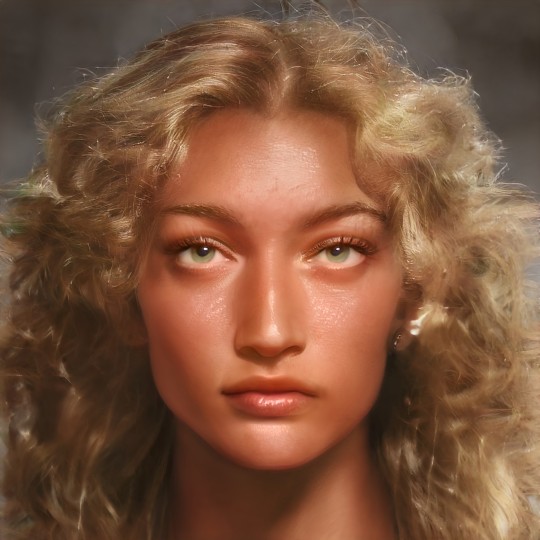


Part 4 of my artbreeder tolkien series. Featured (in order) Finwe, Míriel, Indis, Findis, and Írimë/Lalwen. Indis has been the hardest one so far because there are so many different interpretations of her and the Vanyar in general. To see the other Finweans, check out the previous parts :)
House of Fëanor - House of Finarfin - House of Fingolfin
79 notes
·
View notes
Photo
Absolutely perfect!! @maddogpony has gone 3 for 3 here! They just all look so real, I feel like if you stepped into Valinor, these are the faces you’d be met with- 💙



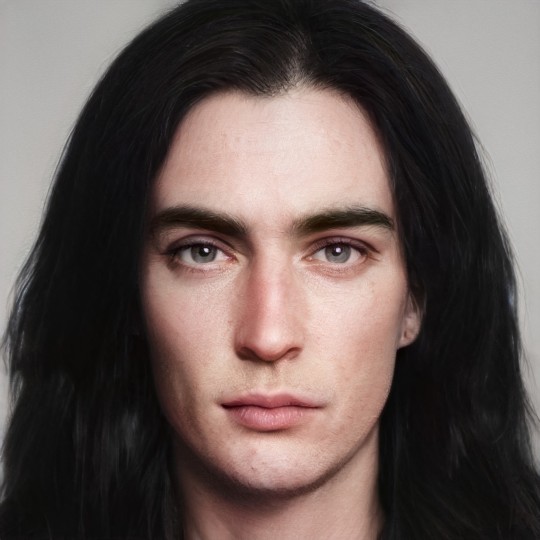


Part 3 of my artbreeder series featuring the House of Fingolfin. In order - Fingolfin, Anairë, Fingon, Turgon, Aredhel, and Argon.
Previous - House of Fëanor - House of Finarfin
#house of fingolfin#house of finwe#noldor#tolkien#silmarillion#fingolfin#anaire#fingon#turgon#aredhel#argon
93 notes
·
View notes
Photo
And @maddogpony does it again and perfectly brings the House of Finwe to life! I adore this! 💙💙


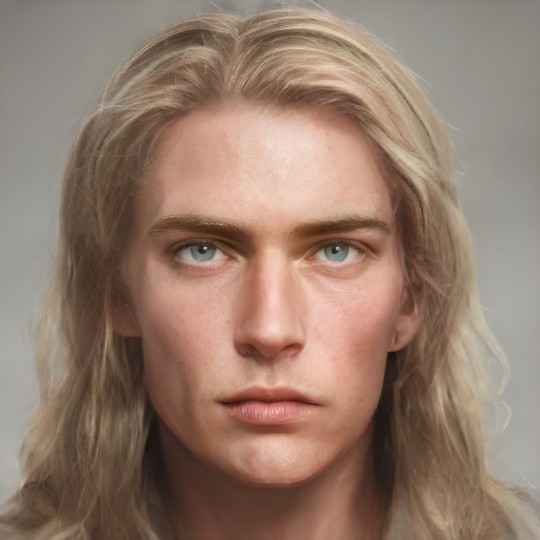



Round 2 of my artbreeder series - this time for the House of Finarfin. My Aegnor is inspired by the fantastic art of Elena Kukanova. In order - Finarfin, Eärwen, Finrod, Aegnor, Angrod, and Galadriel.
House of Fëanor
#house of finarfin#house of finwe#tolkien#finarfin#eärwen#finrod#aegnor#angrod#galadriel#silmarils#the silmarillion
217 notes
·
View notes
Photo
I love them- such a gorgeous drawing by @chillyravenart
💙💙
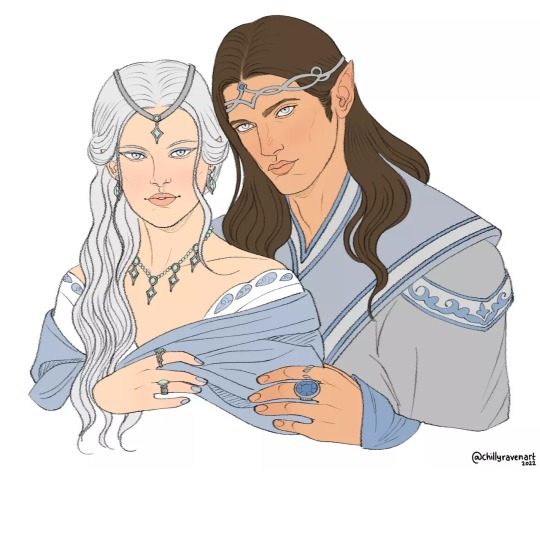
Elrond And Celebrian by chillyravenart
505 notes
·
View notes